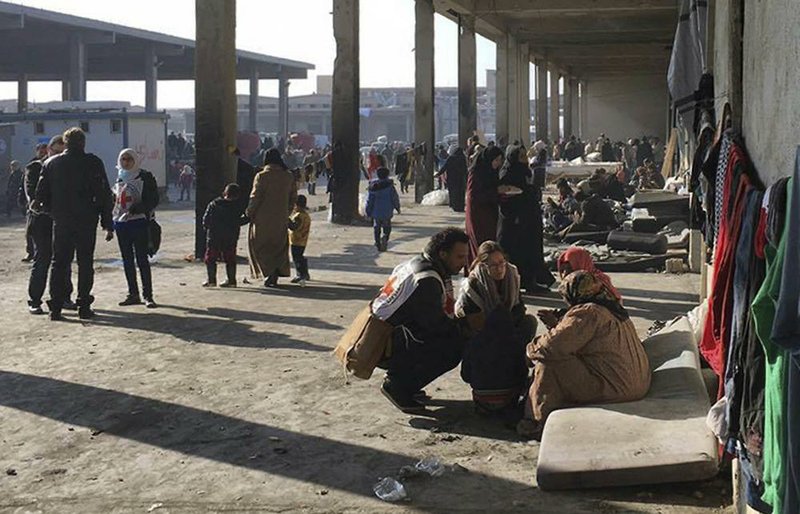BEIRUT -- Syrian rebels retreated from former strongholds in eastern Aleppo in a "terrifying" collapse Monday, holding on to a small sliver of territory packed with fighters and thousands of civilians as government troops pressed on with their rapid advance.
The Syrian military said it had gained control of 99 percent of the former opposition enclave in eastern Aleppo, signaling an impending end to the rebels' four-year hold over parts of the city as the final hours of battle played out.
"The situation is very, very critical," said Ibrahim al-Haj of the Syrian Civil Defense, volunteer first responders who operate in rebel-held areas. He said he was seeking shelter for himself and his family, fearing clashes or capture by the government.
Retaking Aleppo, which has been divided between rebel- and government-controlled zones since 2012, would be President Bashar Assad's biggest victory in the country's civil war. But it does not end the conflict: Significant parts of Syria are still outside government control, and swaths of the country have been devastated. More than a quarter of a million people have been killed.
On Sunday, the Islamic State militant group reoccupied the ancient town of Palmyra, taking advantage of the Syrian army and its Russian backers' preoccupation with the fighting in Aleppo. On Monday, the Britain-based Syrian Observatory for Human Rights said Islamic State fighters were on the verge of imposing a siege on a nearby army base known as T4.
The Islamic State recapture of Palmyra nine months after it was retaken by Syrian government and Russian troops led to mutual recriminations between Western officials and Moscow.
French Foreign Minister Jean-Marc Ayrault accused Russia of "pretending to fight terrorism" while it concentrated on Aleppo, leaving room for the militants to retake Palmyra. Russian Foreign Minister Sergey Lavrov lashed back, accusing the U.S.-led coalition of orchestrating the Palmyra takeover "in order to give a respite to the bandits sitting in eastern Aleppo."
[EMAIL UPDATES: Sign up for free breaking news alerts + daily emails of the day's top headlines]
In Aleppo, staff members of the last remaining clinic in rebel-held territory huddled in a shelter as Syrian government forces pushed in. "Those killed and wounded are left on the streets," said the clinic's administrator, Mohammed Abu Rajab.
"The collapse is terrifying," said Bassam Haj Mustafa, a rebel spokesman in contact with fighters in the city. Opposition fighters were "doing their best to defend what is left," he said.
Rami Abdurrahman, who heads the Observatory, said more than 60 civilians and fighters were killed in rebel-held neighborhoods of Aleppo on Monday alone.
"The battle of Aleppo has reached its end. It is just a matter of a small period of time, no more, no less. ... It's a total collapse," he said.
Russia, a key ally of Assad, refused an American proposal for a temporary halt to the fighting to allow the safe departure of those remaining in rebel-held areas, said a U.S. official speaking on condition of anonymity because he was not authorized to discuss the matter publicly. The proposal came during weekend talks in Geneva between U.S. and Russian experts that had been billed as an eleventh-hour attempt to ease Aleppo's endgame.
Osama Abo Zayd, a legal adviser to the Free Syrian Army rebel coalition, said some fighters had agreed to evacuate but that the Russians had demanded that all militants surrender, something he said was impossible.
"This pushes us to fight to the last breath despite what we have to face," he said.
Live footage aired Monday on Syrian state TV showed scores of people waving Syrian flags and posters of Assad in the streets of the city's government-controlled sector, celebrating what they called "the victories of the Syrian Arab army against terrorism."
The loss of Aleppo would mark the biggest defeat for the rebels since the conflict began in 2011. The insurgents still control northwestern Idlib province as well as patches of territory elsewhere in the country.
Earlier Monday, Syrian troops and allied Shiite militiamen from Lebanon, Iraq and Iran captured Sheikh Saeed, a sprawling neighborhood in eastern Aleppo.
The military also claimed to have retaken al-Fardous, one of the most populous districts.
Tens of thousands of civilians have fled to government-held western Aleppo since the offensive began last month, but tens of thousands of others are believed to remain in the city's east.
Many of those who remain have said they cannot leave.
Some fear getting caught and even disappearing in the dragnet of government detentions. The United Nations has received reports that the rebels have stopped people from leaving.
"They have been killing us for so long. Why would they have mercy?" asked one resident, who gave his name as Ahmed al-Shaer.
A rebel fighter, speaking on condition of anonymity for fear of reprisals, said most of the remaining civilians were massed in two or three neighborhoods, raising the specter of mass casualties if they are targeted by airstrikes or artillery. He said the collapse of the Sheik Saeed neighborhood meant the loss of the rebel enclave's last mill and grain warehouse.
A map distributed by the Syrian military showed rebel control limited to a small sliver of territory spread across six neighborhoods in the city center.
The offensive began Nov. 26 and followed an intensive aerial campaign that knocked out most of the medical facilities in eastern Aleppo, which has been besieged by government forces since July.
Residents said Monday that roads in the rebel-held districts were awash with civilians camped out and huddling in the winter cold.
"Life in Aleppo has become a slow death," al-Shaer said. "You watch everything and everyone dear to you disappear."
Information for this article was contributed by Sarah el Deeb, Zeina Karam, Albert Aji, Jamey Keaten and Dusan Stojanovic of The Associated Press; and by Louisa Loveluck, Liz Sly, Heba Habib and Zakaria Zakaria of The Washington Post.
A Section on 12/13/2016

